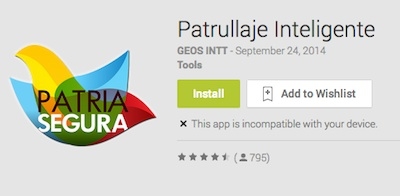Venezuela has launched a smartphone app that connects users to the nearest police unit in case of emergency, part of the more progressive side of the government’s new security strategy.
Starting September 24, Venezuelans with smartphones will be able to download the “Intelligent Patrolling” (Patrullaje Inteligente) app for Apple and Android operating systems, announced Interior and Justice Minister Miguel Rodriguez Torres.
The app forms part of a security plan — also called “Intelligent Patrolling” — that the government launched in January. The plan involved dividing certain municipalities in Caracas into quadrants, and assigning police units to patrol them. At the time, the government argued that this plan would allow the police to respond more quickly to crime, and would enable better community policing.
The app allows users to contact the police unit responsible for their quadrant, based on the user’s current location. Users will also receive security alerts, and will be able to look up crime data within a given neighborhood.
Torres also announced that authorities are currently in talks with the leaders of 16 gangs in the country, discussing their possible disarmament. The gangs would hand over their guns as part of another recently launched government effort, known as the National Disarmament Plan, in which civilians are encouraged to voluntarily turn in their weapons.
InSight Crime Analysis
Venezuela’s Intelligent Patrolling initiative is a welcome effort to encourage better community policing in the capital. Colombia’s capital Bogota implemented a similar plan in 2011 and experienced a subsequent drop in crime. Chile has also used a similar approach, dividing up Santiago into “quadrants” and then assigning more police to the areas where they are most needed.
There have been other attempts across Latin America to create smartphone apps that would encourage reporting of crime. Venezuela’s app faces the same challenge as these apps in other countries: their success is dependent on whether people actually use it. And people are unlikely to use the app unless they are convinced that it will work.
The question, then, is whether Caracas police are capable of using the information given to them via the app to become more effective at fighting crime, thereby building the public’s trust in their abilities and encouraging more people to actually use this new tool. Given the persistent levels of violence and insecurity in Caracas — as well as endemic police corruption — this will be no easy task.

